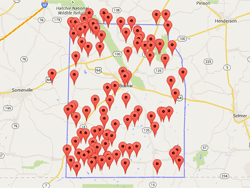As we learn, a meeting was held at Grand Junction on last Tuesday evening for the purpose of forming a new county, to be composed of a portion of Hardeman and Fayette, and we deem it proper to inform our readers of the movement, frankly avowing, however, that there is not, according to the fundamental State law, sufficient territory for the formation of a new county, and will quote from the Code, article III, sec. 82, page 87, for the purpose of introducing the subject:
“New counties may be established by the Legislature to consist of not less than three hundred and fifty square miles, and which shall contain a population of four hundred and fifty qualified voters. No line of such county shall approach the Court House of any old county from which it may be taken, nearer than twelve miles. No part of a new county shall be taken off to form a new county, or a part thereof, without the consent of a majority of the qualified voters in such part taken off; and in all cases where an old county may be reduced, for the purpose of forming a new on, the seat of justice in said old county shall not be removed without the concurrence of two-thirds of both branches of the Legislature; nor shall said old county be reduced to less than six hundred and twenty five square miles.”
Hardeman county is 22-1/2 miles one way and thirty miles the other, and consequently contains about 675 square miles. So, it will be seen, she only has about 50 square miles that can be appropriately be the new county, because the law says the old county shall not be reduced to less than 625 square miles. As to Fayette county, it is certain that she cannot five up three hundred square miles. This being so, we ask, where is the territory that is to form the new county? Under the law, we are satisfied that no sane man could or would object to the formation of a new county if there was territory to form it.
The law itself provides for such procedure but it plain and unmistakable, and the facts in the case must necessarily convince every one who reads the section quoted that Hardeman cannot, without violation or a change of the law, contribute more than fifty square miles to the new county. We have deemed it our duty to say this much, at this time, concerning the movement put on foot, knowing that sooner or later, the subject will attract no little attention from abler minds than ours. Certainly the new county could be formed if the territory could be found, and a majority of the qualified voters within the proposed bounds were favorable to the project.
The Bolivar bulletin. (Bolivar, Hardeman County, Tenn.), 28 Sept. 1867, Page 2. Chronicling America: Historic American Newspapers. Lib. of Congress.




